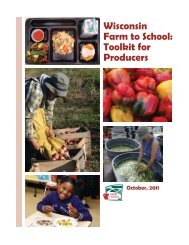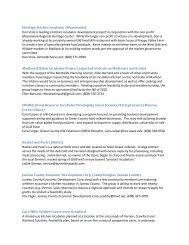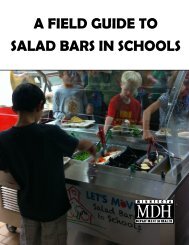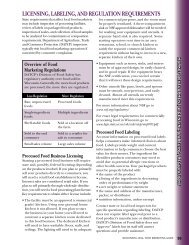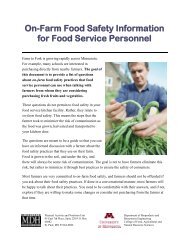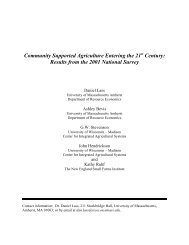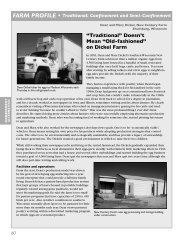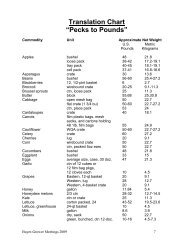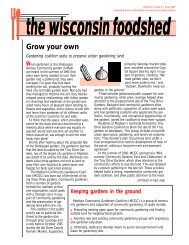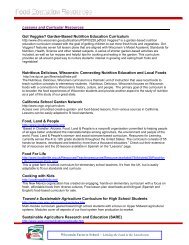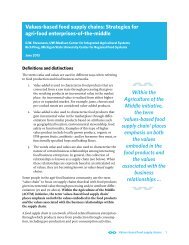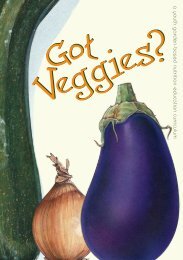Poultry Your Way - Center for Integrated Agricultural Systems ...
Poultry Your Way - Center for Integrated Agricultural Systems ...
Poultry Your Way - Center for Integrated Agricultural Systems ...
Create successful ePaper yourself
Turn your PDF publications into a flip-book with our unique Google optimized e-Paper software.
FARM PROFILE • Organic<br />
Other enterprises<br />
The Desenses raised more than 60 geese in 2003. Because Ron has developed a list of people who frequent the<br />
farmer’s market, he managed to sell all of the geese. The feedback they received was very positive. Geese eat more<br />
grass than chickens, ducks, or turkeys, so geese are cheaper to feed and have a very healthy meat. “Geese start<br />
eating grass from the day you get them,” said Ron.<br />
The Desenses only raise livestock products—beef, veal, chicken, and eggs at this time, but would like to add goats.<br />
They also plan to raise some turkeys this year, but since turkeys like to roam, they may have to find a way to<br />
confine birds.<br />
Organic certification<br />
The Desenses’ farm has been operated organically since 1983. Presently, they are<br />
certified organic by the Organic Crop Improvement Association International<br />
(OCIA). Ron developed his organic plan <strong>for</strong> poultry over one winter. “I’ve raised<br />
chickens <strong>for</strong> over 20 years,” he explains, “so there wasn’t much to change, or add,<br />
when we certified our poultry.” Once every year, the inspector arrives at their farm<br />
by appointment and reviews their records and operation. This usually involves<br />
viewing copies of labels from all feed supplements and inputs into their soil. The<br />
certifier wants verification that a seamless audit trail exists between the inputs to<br />
the farm and the product sold to customers.<br />
Chicks must be fed a certified organic ration until they are processed and packaged in a certified organic<br />
processing facility. Laying hens must meet these same criteria. Often, farms will buy “ready-to-lay” pullets from<br />
another producer. This supplier must be certified organic <strong>for</strong> the pullets, and subsequently the eggs they lay, to<br />
qualify as certified organic. All purchase and sales records of where one buys and sells poultry must be kept on<br />
hand <strong>for</strong> the inspector to review.<br />
Ron spends about one-half hour per week maintaining his records <strong>for</strong> organic certification. “Grass-based<br />
production makes organic farming easy,” stated Ron. “If one is considering conversion to organic production, this<br />
is the best way to operate your farm.” The pastured poultry model of production reduces the amount of organic<br />
grain needed <strong>for</strong> feed, thus lowering the cost of production.<br />
Ron with customer at Minneapolis Farmers’<br />
Market.<br />
Organic certified chicken<br />
packaged <strong>for</strong> market.<br />
Marketing<br />
The Desenses direct market to a list of customers they developed<br />
over the past 20 years. They also sell at farmers’ markets, such as the<br />
Minneapolis Farmer’s Market on Lyndale Avenue near downtown. “Most<br />
of our customers are quite loyal,” states Ron. Although the Desenses now<br />
sell only frozen chickens <strong>for</strong> convenience reasons, they plan to market<br />
fresh chickens next year because, according to Arthur, fresh chickens are<br />
generally more popular.<br />
“Marketing is very important,” Arthur said, “you have to like to sell.” Over<br />
the last twenty years, the Desenses have tried many different outlets <strong>for</strong><br />
their farm goods. In addition to farmers’ markets, they have met people<br />
at gas stations to distribute food when there weren’t any markets open.<br />
Ron feels that they are selling themselves, not just the food. “We let<br />
people know that our farm is sustainable and we’re not going to trash the<br />
resources. We set aside ten percent of our land as wilderness. If people are<br />
willing to pay a little more <strong>for</strong> our product, we’ll keep producing … it’s a<br />
social contract.” He added, “We practice what we preach. We eat organic<br />
food while the best car we’ve got is probably worth $500. We spend<br />
thousands every year on organic food.”<br />
91<br />
MANAGEMENT<br />
ALTERNATIVES



